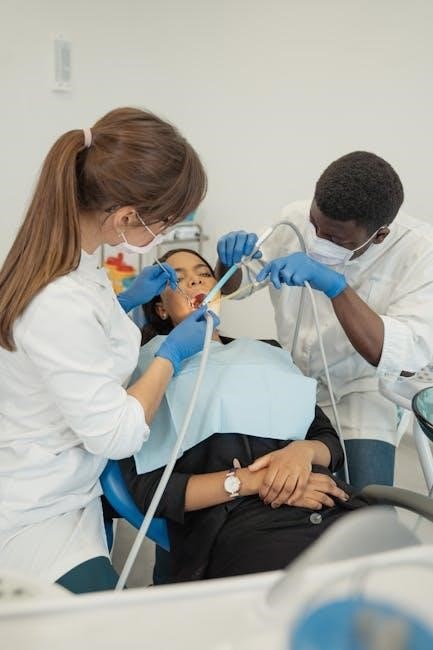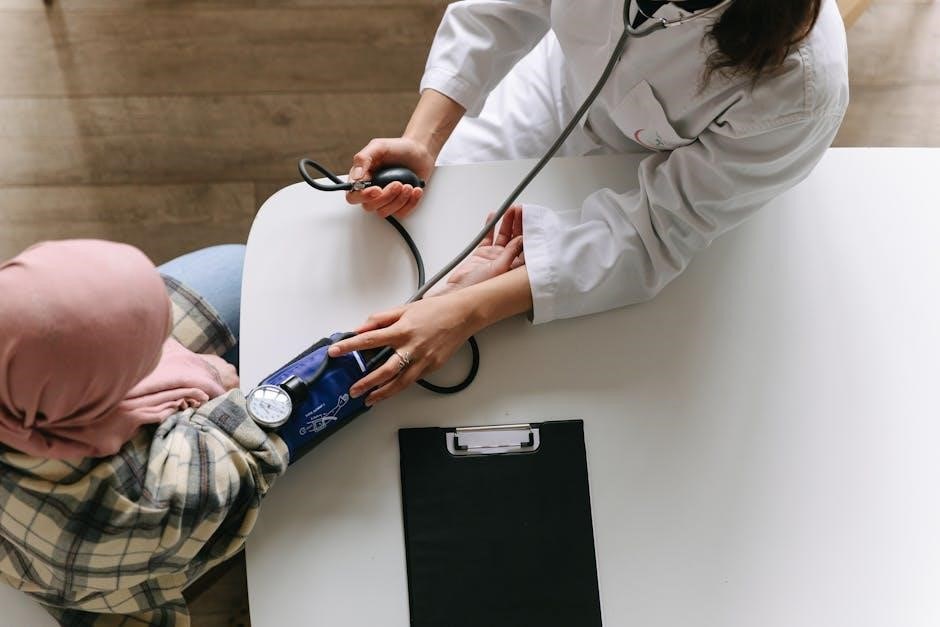A comprehensive guide for evaluating clinical and administrative skills‚ ensuring proficiency in healthcare settings‚ and aiding in professional development.
1.1. Purpose and Importance of the Checklist
The checklist ensures proficiency in clinical and administrative tasks‚ compliance with legal standards‚ and ethical practices. It guides professional development‚ verifies competency‚ and enhances patient care quality. By standardizing evaluation‚ it helps identify strengths and areas for improvement‚ ensuring consistent performance in healthcare settings. Regular use promotes accountability‚ efficiency‚ and adherence to industry standards‚ making it an essential tool for medical assistants and employers alike.
1.2. Key Areas Covered in the Checklist
The checklist covers clinical skills‚ such as measuring vital signs and assisting with exams‚ and administrative tasks‚ like managing records and billing. It also includes technical procedures‚ such as phlebotomy and diagnostic testing. Communication skills and ethical practices are emphasized to ensure patient care and confidentiality. The checklist also addresses emergency preparedness and infection control‚ providing a holistic evaluation of a medical assistant’s abilities.
1.3. Benefits of Using a Competency Checklist for Medical Assistants
Using a competency checklist ensures improved performance and compliance with standards. It helps identify skill gaps‚ enhances patient care quality‚ and streamlines administrative tasks. The checklist also promotes consistent evaluation‚ allowing employers to verify proficiency efficiently. This tool supports professional development and fosters a culture of continuous improvement‚ ultimately benefiting both the medical assistant and the healthcare organization by ensuring accurate and efficient task execution.
Administrative Competencies
Essential tasks include patient intake‚ scheduling‚ records management‚ and billing. These skills ensure smooth office operations‚ accurate documentation‚ and efficient patient care coordination.
2.1. Patient Intake and Registration
Patient intake and registration are critical tasks that ensure a smooth start to patient care. Medical assistants must gather accurate personal and medical histories‚ verify insurance coverage‚ and prepare necessary documentation. This process includes collecting consent forms‚ updating records‚ and ensuring confidentiality; Efficiently managing intake helps streamline workflows‚ reduces delays‚ and enhances the overall patient experience. Proper organization and attention to detail are essential for maintaining accurate and up-to-date patient information.
2.2. Scheduling Appointments
Scheduling appointments is a key administrative task for medical assistants. It involves coordinating patient visits‚ managing provider calendars‚ and ensuring efficient use of clinic time. Competency includes using scheduling software‚ assigning time slots‚ and confirming appointments via phone or email. Accurate documentation and communication are essential to avoid conflicts and ensure a smooth patient flow. Effective scheduling enhances practice efficiency and improves patient satisfaction.
2.3. Managing Medical Records
Managing medical records involves maintaining accurate‚ confidential‚ and organized patient files. Competency includes documenting patient information‚ ensuring HIPAA compliance‚ and securely storing records. Tasks encompass filing‚ archiving‚ and retrieving documents efficiently. Proficiency in electronic health records (EHR) systems is essential for updating and accessing patient data. Accurate record-keeping ensures seamless communication among healthcare providers and supports continuity of care‚ making it a critical administrative skill for medical assistants. Proper handling prevents errors and maintains patient trust.
2.4. Billing and Insurance Claims
Medical assistants must handle billing and insurance claims efficiently. This involves verifying patient eligibility‚ processing claims‚ and understanding coding systems like ICD-10 and CPT. Proficiency in insurance billing software and EHR systems is crucial. Tasks include preparing invoices‚ managing accounts receivable‚ and ensuring compliance with HIPAA. Accurate coding and timely submissions prevent delays and enhance practice revenue‚ making this skill vital for smooth office operations and patient satisfaction.

Clinical Competencies
Covers essential clinical skills‚ including vital signs measurement‚ assisting with exams‚ performing diagnostic tests‚ and infection control‚ ensuring safe and effective patient care in healthcare settings.
3.1. Vital Signs Measurement
Accurate measurement of temperature‚ pulse‚ respiratory rate‚ blood pressure‚ and oxygen saturation is crucial for assessing patient health. Medical assistants must demonstrate proficiency in using appropriate equipment and techniques. The competency checklist evaluates their ability to record vital signs correctly and interpret abnormalities. Proper documentation and adherence to infection control protocols are also assessed. This skill is foundational for providing high-quality patient care and ensuring accurate clinical decisions.
3.2. Assisting with Physical Exams
Medical assistants must prepare examination rooms‚ ensure patient privacy‚ and position patients correctly. They assist healthcare providers by draping patients appropriately and handling equipment. The competency checklist evaluates their ability to maintain asepsis‚ accurately document findings‚ and ensure patient comfort. Proficiency in these skills is essential for effective patient care and seamless collaboration with healthcare teams during physical examinations.
3.3. Performing Diagnostic Tests
Medical assistants are trained to perform various diagnostic tests‚ such as rapid strep‚ glucose‚ and pregnancy tests. They must accurately prepare specimens‚ operate equipment‚ and interpret results within normal ranges. The checklist ensures proficiency in procedures like ECG lead placement‚ urinalysis‚ and stool testing. Proper documentation and adherence to safety protocols are critical for reliable outcomes and patient safety during diagnostic procedures.
3.4. Infection Control and Sterilization
Infection control and sterilization are critical skills for medical assistants. Proper handwashing‚ use of PPE‚ and surface disinfection are essential. They must correctly sterilize equipment using autoclaves or chemical methods. Understanding protocols for handling biohazardous waste and maintaining asepsis during procedures ensures patient safety. The checklist verifies mastery of these practices to prevent infections and maintain a safe environment for patients and staff.
Technical and Diagnostic Skills
This section covers essential technical skills‚ including phlebotomy‚ ECG procedures‚ and using medical equipment. It ensures proficiency in diagnostic tests and accurate patient care delivery.
4.1. Phlebotomy and Blood Collection
Proper phlebotomy techniques are essential for accurate blood sample collection. This includes patient identification‚ vein selection‚ and correct use of needles and vacutainers. Ensure proper labeling to prevent mix-ups. Follow safety protocols to minimize risks of contamination or exposure. Competency in blood collection is critical for reliable lab results and patient safety. Regular training and practice are necessary to maintain proficiency in this skill.
4.2. ECG and Other Diagnostic Procedures
Accurate ECG lead placement and interpretation are vital for assessing heart activity. Properly prepare equipment‚ ensure patient comfort‚ and maintain safety protocols. Competency includes performing ECGs‚ Holter monitors‚ and stress tests. Proficiency in other diagnostic procedures‚ such as spirometry or peak flow tests‚ ensures reliable results. Regular training and adherence to guidelines are essential for maintaining accuracy and patient safety in these critical tasks.
4.3; Using Medical Equipment
Properly prepare‚ operate‚ and maintain medical equipment to ensure accurate diagnostic results. This includes autoclaving‚ sterilization‚ and routine calibration. Proficiency in using devices like ECG machines‚ spirometers‚ and blood pressure monitors is essential. Understanding safety protocols and troubleshooting common issues ensures efficient workflow. Regular maintenance and adherence to manufacturer guidelines are critical for optimal equipment performance and patient care. Competency in equipment usage is vital for reliable outcomes.
4.4. Point-of-Care Testing
Accurately perform and interpret point-of-care tests such as rapid strep‚ glucose‚ and pregnancy tests. Ensure proper handling‚ storage‚ and disposal of testing materials. Follow manufacturer guidelines for test kits and devices. Maintain quality control measures to ensure reliable results. Document findings accurately and communicate results to healthcare providers. Proficiency in these skills enhances patient care and streamlines clinical decision-making in real-time.

Communication and Interpersonal Skills
Develop strong patient communication‚ provide clear education‚ and maintain confidentiality. Collaborate effectively with healthcare teams‚ ensuring respectful and professional interactions to enhance patient care and teamwork.
5.1. Patient Communication and Education
Effective communication involves explaining procedures‚ discussing treatment options‚ and educating patients on medications and self-care. Clear‚ empathetic interactions build trust and ensure patients understand their care plans. This skill is vital for improving health outcomes and patient satisfaction‚ emphasizing cultural sensitivity and adaptability to individual needs.
5.2. Interacting with Healthcare Teams
Medical assistants must collaborate effectively with physicians‚ nurses‚ and other healthcare professionals. Clear communication and active listening are essential for coordinating patient care. They serve as liaisons‚ ensuring seamless workflows and maintaining a positive‚ professional demeanor; This fosters a cohesive team environment‚ enhancing efficiency and patient outcomes through mutual respect and responsiveness to colleagues’ needs.
5.3. Handling Confidential Patient Information
Medical assistants must strictly adhere to HIPAA guidelines‚ ensuring patient confidentiality. They handle sensitive data securely‚ avoiding unauthorized disclosure. Proper protocols are followed for accessing‚ storing‚ and sharing records. Discretion is maintained in discussions and documentation. Breaches can lead to legal consequences‚ emphasizing the importance of ethical practices. Competency in this area is crucial for maintaining patient trust and upholding professional standards in healthcare settings.

Legal and Ethical Considerations
Medical assistants must adhere to legal standards‚ including HIPAA compliance‚ and uphold ethical practices to protect patient rights and maintain confidentiality in all healthcare interactions.
6.1. HIPAA Compliance
HIPAA compliance is crucial for medical assistants to ensure patient privacy and data security. This involves safeguarding Protected Health Information (PHI)‚ understanding electronic health record protocols‚ and adhering to confidentiality standards. Proper training and adherence to policies prevent breaches‚ ensuring legal and ethical handling of patient information. Compliance is mandatory to avoid penalties and maintain trust in healthcare settings.
6.2. Medical Ethics in Practice
Medical ethics guide healthcare professionals in making decisions that respect patient rights and dignity. Key principles include confidentiality‚ non-maleficence‚ beneficence‚ and autonomy. Medical assistants must uphold these ethical standards to ensure compassionate and responsible care. Adhering to ethical practices fosters trust and integrity in patient-provider relationships‚ aligning with legal requirements and professional codes of conduct in healthcare settings.
6.3. Understanding Medical Laws and Regulations
Medical assistants must comply with laws and regulations governing healthcare‚ including HIPAA‚ OSHA‚ and state-specific mandates. These laws protect patient confidentiality‚ ensure workplace safety‚ and regulate medical practices. Understanding legal requirements helps prevent violations‚ maintains patient trust‚ and supports ethical healthcare delivery. Staying informed about updates ensures adherence to evolving standards and avoids legal repercussions in clinical and administrative tasks.

Emergency Preparedness and Response
Ensuring medical assistants are trained to handle emergencies‚ including first aid‚ crisis management‚ and protocol implementation‚ to maintain patient safety and effective response during critical situations.
7.1. Basic Life Support and First Aid
Medical assistants must demonstrate proficiency in basic life support and first aid‚ including CPR‚ AED usage‚ wound care‚ and injury assessment. They should be trained to respond to choking‚ burns‚ and fractures‚ ensuring patient safety and stabilization. Knowledge of infection control during emergencies is critical. Regular training and certification in BLS and first aid are essential for maintaining competency and providing immediate‚ effective care in critical situations.
7.2. Handling Medical Emergencies
Medical assistants must be adept at assessing emergency situations‚ implementing protocols‚ and providing immediate care. This includes activating emergency response systems‚ notifying healthcare providers‚ and maintaining patient airways. Proficiency in controlling bleeding‚ managing shock‚ and stabilizing injuries is essential. Documentation of emergency interventions and outcomes is critical for continuity of care and legal compliance‚ ensuring timely and effective responses to life-threatening scenarios.
7.3. Emergency Protocols and Procedures
Emergency protocols and procedures are critical for medical assistants to ensure prompt and effective responses during crises. These include activating emergency response systems‚ documenting incidents‚ conducting fire drills‚ and executing evacuation plans. Proper use of emergency equipment‚ such as defibrillators and first aid kits‚ is vital. Adherence to these protocols ensures patient safety and efficient care delivery‚ requiring both knowledge and practical skill proficiency.

Creating a Comprehensive Competency Checklist
A well-structured checklist ensures all clinical and administrative skills are evaluated‚ promoting accuracy and thoroughness in assessing medical assistant competencies effectively.
8.1. Identifying Core Competencies
Identifying core competencies involves pinpointing essential skills and knowledge required for medical assistants‚ such as infection control‚ vital signs measurement‚ and administrative tasks. This step ensures the checklist addresses critical areas‚ providing a clear framework for evaluation. Core competencies are fundamental to both clinical and administrative roles‚ ensuring comprehensive assessment and proficiency in healthcare settings. They form the backbone of the competency checklist‚ guiding effective skill development and evaluation.
8.2. Designing the Checklist Format
Designing the checklist format involves creating a structured layout that clearly categorizes competencies for easy evaluation. It should include sections for clinical and administrative skills‚ with checkboxes or marking systems for proficiency levels. A PDF-friendly design ensures accessibility‚ with clear headings and bullet points for readability. Including space for notes or comments enhances feedback utility. Consistency in design across sections ensures uniformity and ease of use‚ making the checklist an effective tool for competency assessment.
8.3. Implementing the Checklist in Practice
Implementing the checklist involves training sessions‚ hands-on practice‚ and feedback loops. Ensure staff understand each competency and how to use the checklist effectively. Regular reviews and updates keep the checklist relevant‚ aligning with evolving healthcare standards. Integration into daily workflows and continuous monitoring ensure its effectiveness in bridging theory and practice‚ enhancing overall performance and patient care quality.
The medical assistant competency checklist is a vital tool for ensuring proficiency‚ enhancing patient care‚ and fostering continuous improvement in healthcare settings.
9.1. Final Thoughts on the Importance of Competency Checklists
A competency checklist is essential for ensuring medical assistants meet standardized skills and knowledge requirements. It helps identify gaps‚ guides professional development‚ and ensures compliance with healthcare standards. By fostering continuous improvement‚ it supports delivering high-quality patient care and maintains excellence in the medical assisting field.
9.2. Continuous Improvement in Medical Assistant Skills
Continuous improvement is vital for medical assistants to adapt to evolving healthcare demands. Regular competency assessments and checklists ensure skills remain current and effective. By identifying knowledge gaps and tracking progress‚ MAs can enhance patient care quality and maintain professional excellence. Lifelong learning fosters confidence and proficiency‚ enabling medical assistants to thrive in dynamic healthcare environments.
